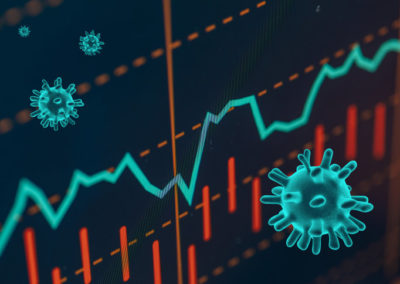Researchers at Imperial College London are committed to being at the forefront of discovery and innovation in cyber security – and their expertise can help all manner of organisations, from National Security Departments and social networks, to banks, NHS and pharmaceutical companies.
Solutions include fighting identity theft and document fraud, anomaly detection, virtual diagnostic networks, information assurance, forensics, risk management, cyber-physical security for networks such as transport and energy – plus security and ethical policy for IoT and cloud computing.
Our experts can advise on and devise solutions to meet these ever growing (and changing) needs.
Statistical Cyber-Security Analytics
The Statistics team are developing data science techniques that enable large dynamic computer networks to identify intrusions and anomalous behaviour and therefore protect against cyber-attacks and fraudulent activity.
Using statistical methodology, machine learning and Big Data analytics the team have developed the tools to perform scalable anomaly detection in high volume data streams such as social networks, telecoms networks, network flow data, host-based sensor process-level data, cyber-physical and IoT data – pinpointing deviations from normal behaviour.
Experts include…
- Prof Niall Adams – expertise in classification, data mining, streaming data analysis and spatial statistics for bioinformatics, cyber-security and retail finance.
- Dr Nick Heard– expertise in computational Bayesian inference, cluster analysis, change point detection, graph analysis and topic modelling for large dynamic networks such as computer networks or social networks – and bioinformatics problems.
- Dr Marina Evangelou – expertise in Bayesian statistics, penalised regression analysis, machine learning and network analysis.
Collaborations include the Government’s National Cyber Security Centre, the Los Alamos National Laboratory, QinetiQ, Heilbronn Institute for Mathematical Research and Crossword Cybersecurity.
EVENT: Read slides and posters from September 2017’s showcase of research into the deployment of statistical methodology, machine learning, Big Data analytics and anomaly detection, forensics, risk management and more.
Systems, web, and mobile security
The Academic Centre of Excellence in Cyber Security Research is a National Cyber Security Centre (NCSC) recognised team working on improving defences for smartphones, mobile apps, laptops and tablets – protecting against hacking of x86 programs, ‘denial of service’ attacks or cyber-physical attacks on digitised services such as train networks, power companies and manufacturers.
Their tools and autonomous system architectures provide sensor networks, autonomous policy-based systems and IoT environments with resilience to malicious compromise, allowing them to operate and maintain integrity if affected. They are also building composable autonomous systems.
Experts include…
- Prof Emil Lupu – expertise in cyber security and resilience of systems including their physical, digital and human characteristics; policy systems, analysis, refinement and implementation, IOT systems, web and mobile.
- Dr Cristian Cadar – expertise in systems security, program analysis for security, exploit detection and mitigation, automated software testing and verification. Co-author of analysis tools including the widely-used symbolic execution engine KLEE (http://klee.github.io/)
- Dr Ben Livshits – expertise in web application and mobile security, privacy, program analysis, compilers, performance, augmented reality, software engineering and crowdsourcing.
IOT security
As adoption of the Internet of Things (IoT) grows, use of Big Data and machine learning increases, whilst human oversight reduces. With homes, infrastructure and healthcare services being digitised, we are opening our physical world up to cyber threats. The PETRAS IoT Research Hub looks at privacy, ethics and security issues of the IoT – and IOT devices.
Experts include…
- Prof Emil Lupu – expertise in cyber security and resilience of systems including their physical, digital and human characteristics; policy systems, analysis, refinement and implementation, IOT systems, web and mobile.
Secure Cloud Computing
Experts within SERECA (Large-Scale Distributed System Group) are developing hardware-assisted secure environments for today’s cloud applications using Intel’s Software Guard eXtension (SGX) technology – allowing the trusted execution of sensitive code in untrusted Cloud platforms. User applications are protected by secure SGX enclaves, which shield the application code and data from the rest of the environment. The goal is to protect sensitive cloud applications from insider threats and other malicious activity.
Trusted execution features in commodity CPUs and provides organisations with high levels of security in cloud environments, without the performance overhead of data encryption and decryption in software.
Further developments include ‘platform-as-a-service’ (PaaS) clouds that provide ‘tenants’ with “end-to-end” protection across the entire workflow of a complex cloud-hosted distributed application.
Experts include…
- Prof Peter Pietzuch – expertise in systems security, hardware security, trusted execution and Intel SGX technology.
Collaborations include Microsoft, Huawei, Intel and the Turing Institute.
Privacy and Cryptography:
Experts include…
- Dr Yves-Alexandre de Montjoye – expertise in mobility traces, computational privacy, metadata, causal inference, Big Data, behavioural modelling, computational social sciences.
Cybersecurity in Healthcare:
Hear more from our Health Security and FinSec experts…
Advisory services
Product design, research methods, data analysis, technology evaluation for investment, technological innovation, patent evaluation, prototype and protocol development, policy, cyber security and more. Assisting museums, writers, film makers and artists to ensure creations scientifically sound.
Expert insight
Membership of Scientific Advisory Boards and Technical Panels, advice and guidance on drug development programmes, thought leadership, conference speakers, literature reviews and provision of foresight.
Analysis and testing
Use of the world-class specialist facilities and technicians at Imperial for projects ranging from aerodynamic measurements and medical imaging to structural testing and analysis.
Our consultants are world-leading experts in their field, committed to on-going research.
Who to contact:

Jamie Pombeiro de Sousa
Engagement Manager
For Materials, Manufacturing, Mechanical Engineering, Computing, Cyber Security, Data Science and AI







